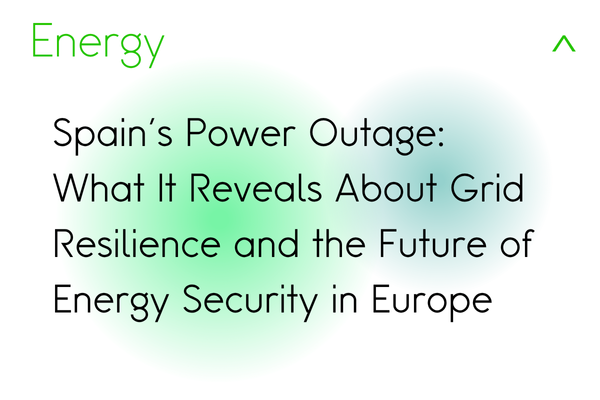Spain's Power Outage: What It Reveals About Grid Resilience and the Future of Energy Security in Europe
01 May, 20254 minsOn April 28, 2025, the Iberian Peninsula experienced a massive power outage that plunged Spa...

On April 28, 2025, the Iberian Peninsula experienced a massive power outage that plunged Spain, Portugal, and parts of southern France into darkness. This major blackout, which took 24 hours to fully resolve, has sparked important conversations about energy security, grid resilience, and the role of renewable energy in Europe's future power systems.
The Blackout: What Happened?
According to initial reports, the blackout began around midday when electricity demand and generation dropped sharply across the Iberian Peninsula. The system briefly stabilised before another drop occurred just seconds later. Shortly after, the critical Spain-France interconnector tripped, leaving Spain and Portugal isolated from the Continental European grid.
The disruption affected all generation sources. Nuclear and coal plants completely shut down, while wind and solar production initially dropped as protection mechanisms activated but then rebounded quickly once conditions stabilised. Critical services including telecommunications, transport systems, and essential infrastructure were severely impacted across the region.
Possible Causes Under Investigation
While investigations are ongoing, early reports from Portuguese energy company REN suggest the blackout might have been triggered by "induced atmospheric vibration" - a phenomenon where extreme temperature variations cause oscillations in high-voltage transmission lines. These oscillations disrupted the synchronisation needed across interconnected electricity grids, potentially leading to cascading failures.
Professor Keith Bell from the University of Strathclyde notes: "Events of this scale have happened in many places around the world over the years, in power systems using fossil fuels, nuclear, hydro or variable renewables. It doesn't matter where you are getting the energy from, you've got to get the engineering right in order to ensure resilient supplies of electricity."
Grid Resilience: The Central Issue
The blackout highlights a critical point that energy experts have been emphasising for years: energy security increasingly depends on grid resilience rather than generation capacity. As Juliet Phillips, energy campaigner at Beyond Fossil Fuels, stated: "As we wait for the cause of the Iberian blackout to be determined, we are reminded of a broader truth: resilient grids and clean flexibility solutions are the foundations of a secure, clean energy future."
The incident demonstrated that:
- Interconnected grids provide benefits but also create vulnerabilities when not properly managed
- Grid stability depends on careful balancing of supply and demand
- Investment in grid infrastructure has not kept pace with changes in energy generation
Giles Dickson, CEO of WindEurope, emphasised this point: "We need to invest urgently in grid resilience, smart infrastructure and energy storage. Renewables are not the problem – they're part of the solution. With the right tools and market design, they can help keep the lights on and Europe competitive."
The Role of Renewables in Energy Security
Interestingly, the blackout revealed some unexpected strengths of renewable energy systems:
- The University of Almería remained operational throughout the blackout thanks to on-site solar and battery storage
- Households across Spain and Portugal used electric vehicle batteries to bridge local power supply gaps
- When electricity began flowing back into the grid, renewables proved more resilient and reliable than nuclear power, which was still down by midday the following day
Professor David Brayshaw from the University of Reading notes that the European system has become increasingly interconnected in recent years: "This is generally positive, helping balance variations in supply and demand, particularly as we decarbonize. But it also means greater interdependence with other countries."
The Path Forward: Grid Modernisation
Energy experts broadly agree that preventing future outages requires significant investment in modernising and strengthening power grids across Europe. Key priorities include:
- Upgrading and expanding transmission infrastructure
- Developing more energy storage solutions at various scales
- Implementing advanced grid management technologies
- Creating better market structures to incentivise flexibility and stability services
- Improving cross-border coordination among system operators
As Professor Chenghong Gu from the University of Bath explains: "Interconnected grids can enjoy higher reliability because resources in the whole system can be shared by all grids in these countries. If there are any issues in one grid, other grids can provide backup supply very quickly."
Talent and Workforce Implications
The Iberian blackout underscores a growing challenge for Europe's energy sector: the urgent need for skilled professionals who understand the complexities of modern power systems. As grids become more sophisticated and integrated with digital technologies, the talent requirements of the energy sector are evolving rapidly.
The transition to more resilient, renewable-based energy systems will require professionals with expertise in:
- Grid planning and operations for systems with high renewable penetration
- Advanced energy storage technologies
- Power electronics and grid-forming inverters
- Digital twins and simulation of complex power systems
- Cybersecurity for critical energy infrastructure
- Energy data analytics and artificial intelligence applications
For recruitment specialists and HR leaders in the energy sector, this presents both challenges and opportunities. Companies will need to develop comprehensive talent strategies that include retraining existing workers, attracting new talent from adjacent fields, and forming stronger partnerships with educational institutions to develop the workforce of tomorrow.
Conclusion: A Wake-up Call for Energy Security
The Iberian blackout serves as a timely reminder that energy security in the 21st century depends not just on having sufficient generation capacity, but on building resilient, flexible, and intelligent grid systems capable of integrating diverse energy sources.
As Europe continues its transition to renewable energy, grid modernisation must become a central priority. The blackout demonstrates that with the right infrastructure and systems in place, renewable energy can contribute positively to system resilience rather than undermining it.
The incident should serve as a catalyst for accelerated investment in grid infrastructure, energy storage, and the development of the skilled workforce needed to design, build, and operate the energy systems of the future. Only through such focused investment can Europe ensure that its energy transition delivers both decarbonisation and enhanced energy security.


